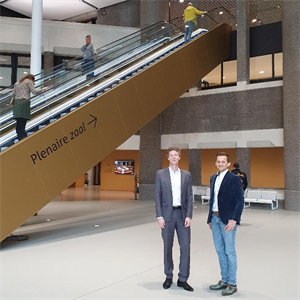Tristan Kohl presents factsheet on World Trade Organization to House of Representatives Committee

Recently, Associate Professor of International Economics Tristan Kohl and Assistant Professor of European and International Law Simon Tans (Radboud University) presented the fact sheet “The Netherlands and the (reform of the) World Trade Organization” (Nederland en de (hervorming van de) Wereldhandelsorganisatie) during a meeting of the House of Representatives Committee on Foreign Trade and Development Cooperation. Kohl and Tans wrote their factsheet in collaboration with Professor of International and European Law Henri de Waele (Radboud University).
The committee gave Kohl and Tans the assignment to map out the interests of the Netherlands regarding the functioning of the World Trade Organization (WTO). They also wanted to gain knowledge about the consequences of the crisis within this international organization on current Dutch trade practices. Tans and Kohl answer these questions in the factsheet. They also show which aspects are important for the Netherlands in the process of reforming the WTO and discuss the alternatives if this reform does not come about.
From an interdisciplinary economic and commercial law perspective, Kohl and Tans stress the importance of the WTO, especially for an open trading economy such as the Netherlands. They argue that the impasse within the WTO does not detract from everything that has already been achieved in the past 70 years of the multilateral trade system. This impasse was the result of the United States' failure to appoint arbitrators to the Appellate Body, and the imposition of tariffs on trade in aluminum and steel by the USA.
Negotiations within an international organization with 164 members with very different ideas and economies, require patience and a return to the negotiating table. Kohl and Tans point, among others, to the success of this organization in limiting the consequences of the 2008 financial crisis and the resulting reflex to protectionism by many countries. The same applies to the negative effects on world trade as a result of the COVID-19 crisis.
In addition, Kohl and Tans draw the conclusion that there is no alternative to regulating trade on a global scale. The current trend towards regulating trade through bilateral free trade agreements can only be seen as a useful development alongside the WTO to prevent fragmentation of trade rules and to minimize uncertainty for international trade.
Finally, Kohl and Tans point to the crucial importance of a rules-based system in international trade compared to a power-based bilateral network of free trade agreements to enable developing countries to build industries in such a way that social rights and sustainability aspects are taken into account.
For more information, please contact Tristan Kohl.
Click here for the factsheet (in Dutch only).
| Laatst gewijzigd: | 01 februari 2023 16:20 |
Meer nieuws
-
01 april 2025
Executive MBA van UGBS best beoordeelde MBA | Nationale Keuzegids 2025
Volgens de onafhankelijke Keuzegids Masters 2025 is de Executive MBA van de University of Groningen Business School de best beoordeelde MBA van Nederland (deeltijd én voltijd).
-
01 april 2025
Executive Master of M&A and Valuation geaccrediteerd als joint degree met Vrije Universiteit Amsterdam
Vanaf 1 september ontvangen deelnemers aan het programma na succesvolle afronding een masterdiploma van zowel de Rijksuniversiteit Groningen als de Vrije Universiteit Amsterdam.
-
05 maart 2025
Vrouwen in de wetenschap
De RUG viert Internationale Vrouwendag met een bijzondere fotoserie: Vrouwen in de wetenschap.
